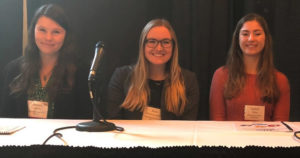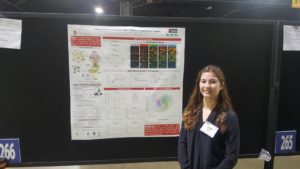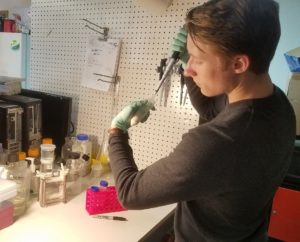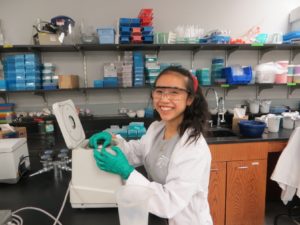As adults, we can all attest to the benefits of attending professional conferences. Conferences provide us with opportunities to present and share with others, network, and renew and refresh in our field. For some of us, that first conference, at the college or early employment level, may have contributed significantly to a sense of ourselves as professionals. But what does it mean to someone younger?
Recently, three high school students enrolled in the Dane County Biotechnology Youth Apprentice (YA) Program were able to attend conferences related to their interest in pursuing Science, Technology, Engineering and Math (STEM) careers. Here’s what they discovered.

Isabel Jones, Verona Area High School senior and second year YA, who works at the Morgridge Institute for Research, presented a scientific poster at one conference and spoke on a panel at another:
The opportunity to attend the annual Biomedical Engineering Society (BMES) conference in Atlanta was initially proposed to me by my Principal Investigator Dr. Melissa Skala, then supported by my mentor Dr. Alex Walsh, as well as some of my other lab members. Morgridge was able to fund my trip, and since I had gathered enough data at that point to present, I jumped on the opportunity. At the conference I presented a poster on the “Characterization of Human CD4+ T Cells using Metabolic Imagining” during a large poster session with undergraduates from across the country. This experience was fascinating since I was able to explore projects from all corners of BME, as well as listen to talks on immunology and cancer research.
By attending this conference, I was able to further progress my professional knowledge by interacting with adults in the field, which I would recommend to any high school student looking to experience the real workforce in a learning-friendly environment.
I was also able to recently attend STEM Forward’s sySTEMnow Conference in Milwaukee, where I spoke on a panel with Josh Fassl, Barbara Bielec, Amani Gillette, and Ava VanDommelen about the Youth Apprenticeship program itself and the opportunities I have gained from it. By participating in this panel, I was reminded that with a strong work ethic, and opportune program such as the Biotechnology Youth Apprenticeship, you can achieve things you never thought possible.
Lucas Bauer, Jefferson High School senior and first year YA, works at Ganser Scientific in Madison and got to see things from a biotechnology business perspective:
In mid-October, my Biotechnology Youth Apprenticeship mentor asked me if I had any interest in attending the 2018 Wisconsin Technology Council-hosted Wisconsin Early Stage Symposium (ESS), which he was already attending to seek funding. I was immediately interested and accepted the offer.
The conference is a once-yearly networking event held at the Monona Terrace Convention Center and aims to connect small startup businesses with funding from investors in order to build successful businesses and includes panel discussions and other sessions throughout the two days.
During the ESS, I was able to talk to investors and entrepreneurs from many fields, including biotechnology, and attend sessions focused on running businesses and the growing technological and biological industries in both Madison and all of Wisconsin. The ESS gave me a great opportunity to not only network with people in the field I wish to enter but also gain a better understanding of the business portion of the life sciences and the process by which new companies fund-raise and develop into industry leaders.
The ESS was a very useful and informative experience, one of many offered by the BTC Institute to its students. I express my deep gratitude to my mentor, Dr. Joe Beck, the Wisconsin Technology Council, and the BTC Institute for providing me with this great opportunity to broaden my horizon and build meaningful connections.
Anita Anongdeth, Monona Grove High School senior and first year YA, was recently hired by the Gilroy Lab in the UW-Madison Department of Botany. She appreciated seeing the bigger picture of biotechnology:
BioForward’s Wisconsin Biohealth Summit was the first conference that I have ever attended. It seemed mostly geared towards businesses within the biotechnology field, but all the speakers and the overall experience was still really cool. The first keynote speaker had a really interesting speech on everything from space travel, to the microscopic buggers that grow on subways. It was like attending a Ted Talk, but packed full of big science words, and geared towards an audience that understood that language. I found myself in this situation most of the conference, where the content was absolutely intriguing, but the language and the way it was presented was, at times, confusing.
My favorite part of the conference was most likely the breakout session after the first keynote speaker. This was a panel with four amazing women who had higher positions within their companies, and their thoughts on how to diversify the work field. I learned that because women are perceived to be more emotional, women must approach any situation purely from a rational and logical standpoint. Women should use logos over pathos when arguing, because of this preconceived thought about women.
I wanted to attend this conference because I’m all about taking advantage of new opportunities and I wanted to experience something new. I would most definitely recommend other students to go to these conferences, even if a lot of the information doesn’t make sense at the time. These types of opportunities are very important to be exposed to because it gives an insight on what I could be doing. Because I am interested in the biotechnology field and simply biology in general, this gives me a goal and an idea of what succeeding in the field looks like.
Isabel, Lucas and Anita were all able to attend these conferences thanks to financial support from people who care about the next generation of STEM professionals. Both Lucas and Anita were offered complimentary registration by BioForward and the Wisconsin Technology Council, the organizations that hosted the events. Something to think about…if you have the opportunity to help organize professional conferences, please consider offering this eye-opening experience to high school students!
Latest posts by Barbara Bielec (see all)
- Conferences Are Important for High School Students—Youth Apprentices and STEM Professional Development - December 3, 2018
- Playing it Forward: Biotechnology Youth Apprenticeship and Mentorship - November 1, 2017
- A Successful Launch for Biotechnology: The Basics for Middle School Teachers - July 5, 2017



